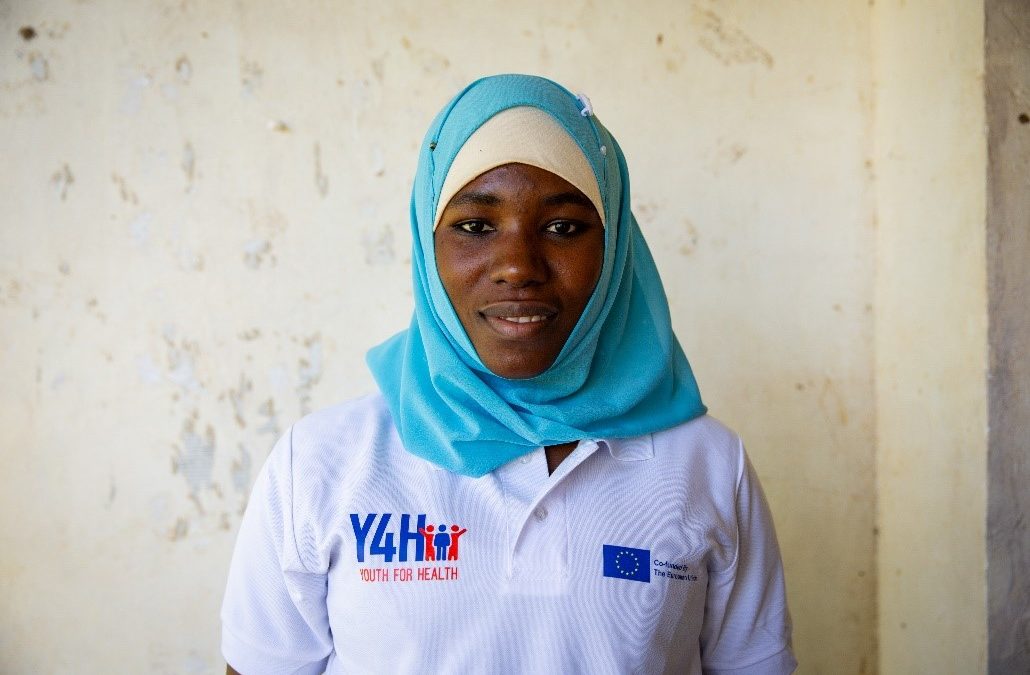Through the Youth for Health project, co-funded by the European Union, MSI Tanzania works with its partners, Sikika and DSW, who train youth champions to advocate for their sexual and reproductive health and rights and hold governments and decision-makers accountable. Mbuya Abass Ngwega, aged 19, is a youth champion who lives in Mwaya village, Ulanga, Morogoro region. Read her story:
“I had a difficult upbringing. I lost my father while I was in primary school and my mother had to take up the responsibility of raising and providing for me and my three brothers. Life wasn’t easy. I was constantly sent home due to a lack of school fees, as my mother works as a small-scale farmer. Unfortunately, I was unable to continue with my studies, so I was forced to drop out of school while in secondary. It was a tough period for me as this meant I could no longer achieve my dreams. In the meantime, I couldn’t stay idle, so I looked for work and got a job as a shop attendant. Despite these challenges, my dreams of becoming a leader were still alive, so I constantly looked for ways and opportunities to fulfil my aspirations. I knew becoming a youth champion was the best way to achieve that.
When I heard that the Y4H project was looking to appoint youth champions in my area, I immediately applied. The selection process was not easy as it was based on defined criteria, which included age, basic formal education, and demonstrated knowledge and interest in adolescent sexual reproductive health and rights/family planning (SRHR/FP), among others. Fortunately, I was selected as one of the youth champions representing the village of Mwaya.
As a youth champion, it is my duty to meet with my peers and discuss various health issues every Wednesday and Thursday of the week. As part of my role, I also participate in the weekend clinics at the Mwaya health centre, where we play games and hold ASRH counselling and education sessions. I sometimes support the service providers by facilitating a session on various topics, such as STIs and HIV/AIDs. I also refer my friends and peers to health centres for access to SRH services – especially contraception.
Among the topics I am passionate about is unintended pregnancies, as this hits closer to home. I had two friends in my class back in school, and both became pregnant. As a result, they had to drop out of school. One tried to procure an abortion, but unfortunately, she lost her life. It was difficult for me as she was my dear friend.
Becoming a youth champion has changed my life. Firstly, my self-confidence has improved. Secondly, I have also had the opportunity to meet and interact with influential people/leaders. I also had the chance to go to the national parliament, where we presented some of our issues for decision-making, which was a big deal for me.
I am thankful to the EU co-funded Y4H project as it has empowered young people like me by giving us a platform to discuss and share some of our challenges openly and, in turn, we have seen progress in solving these issues. I can say that, to some extent, some of the challenges we present during our hearing sessions with local leaders have been resolved. For instance, we presented an issue on a health centre at Mwenge village lacking youth-friendly rooms, and soon enough, a youth-friendly room was assigned at the facility, where adolescents and youth can go and get services confidentially and without judgement.”
The Youth for Health Project
The Youth for Health (Y4H) project is a three-year initiative co-funded by the European Union that works to expand access to life-changing adolescent sexual and reproductive healthcare and rights. Its focus is on reaching the poorest and most marginalised adolescent girls, including those living with disabilities, and in rural and hard-to-reach areas of Ethiopia, Ghana, Kenya, Sierra Leone, Tanzania, and Zambia. By unlocking demand and access and contributing towards changes in favour of supportive policies and funding environments, Y4H will increase and sustain access to reproductive choices for girls and young women.
It is being implemented by MSI Reproductive Choices together with Deutsche Stiftung Weltbevölkerung (DSW), Centre for the Study of Adolescence (CSA) Kenya, Health Alert Sierra Leone (HASiL), Youth Advocates Ghana (YAG), Sikika in Tanzania, Restless Development Zambia and Youth Network for Sustainable Development (YNSD) in Ethiopia.

